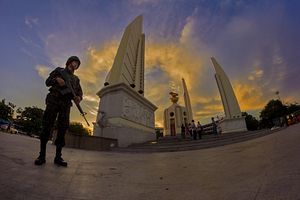The Thai army put the final touches on its grip on power Thursday, with coup leader, Army Chief Prayuth Chan-ocha installed as prime minister by a national assembly picked by the junta. He received 191 of 197 votes, with none in the assembly actually voicing opposition to the sole candidate. Since taking power on May 22 after Prime Minister Yingluck Shinawatra was removed due to a court ruling, Prayuth and the junta have ruled unopposed while slowly consolidating the military’s power over all aspects of the government. Although his election still needs to be endorsed by King Bhumibol Adulyadej, approval is expected to be a formality that will likely occur by next week, after which Prayuth is expected to form a Cabinet.
After the removal of the caretaker Prime Minister Miwattumrong Boonsongpaisan in May, Prayuth has ruled in all but name. The junta’s adoption of a 48 article constitution in July further solidified its hold on power, granting it the ability to choose the members of legislative, executive and judicial bodies to oversee the country during the interim, as well as restricting those with prior political affiliation in the last three years from participating in the national assembly, which is now full of former or active military officers. In addition to this unqualified level of control, the new constitution allows Prayuth to become prime minister while still holding his military title, although he is expected to retire in September.
The new government is expected to stay in power until at least the fall of 2015, when a general election is tentatively scheduled to take place. The junta has justified its long grip on power as necessary to return the country to normal after substantial protests beginning in late 2013, while it has effectively silenced the Red Shirt faction led by Yingluck and her brother, former Prime Minister Thaksin Shinawatra (currently in self-imposed exile in Dubai), by forcing them to sign agreements that in effect silence their ability to publicly protest the army’s actions.
Prayuth’s installation is a sign that the military, and to a lesser degree the Yellow Shirt faction of pro-monarchists and urban elite, don’t see a viable long-term solution to stemming the popular support of the Red Shirt faction headed by the Shinawatra family, whose power base mainly resides in the rural communities of the north and northeast. Indeed, the junta’s new constitution and the election of Prayuth, who helped orchestrate the military’s response to a 2010 pro-Thaksin Red Shirt rally, which killed dozens, shows that the army intends to remove as much of the Thanksin’s political influence as possible before next year’s elections.
Somewhat ironically, Prayuth said just after the coup in May that “I will not allow Thailand to be like Ukraine or Egypt.” However, the general’s unopposed installment as leader amidst a very strong crackdown on public and political opposition is at the very least reminiscent of Abdel el-Sisi’s recent ascent to power in Egypt.
Even as the U.S. and European countries have made appeals for Thailand to make a swift return to democracy, this most recent coup has not seemed to have had a sustained or substantially negative effect on business sentiment in the country. The Japanese automotive industry in particular waited just a week after the junta took power to resume operations and continue investment. News of Prayuth’s election barely registered on the Stock Exchange of Thailand on Thursday, which closed slightly up compared to Wednesday, while other regional markets experienced a slight downturn. The country’s economic outlook remains positive, according to analyst Mayuree Chowvikran at Maybank Kim Eng (Thailand), as long as Prayuth installs technocrats in important Cabinet posts like commerce, finance and transport, and not members of the army.
While the day-to-day life and economic prospects of Thailand look to have been relatively unaffected by the latest coup, the political situation could be in for a much more substantial change. It appears that the military is intent on removing the Thaksin faction’s ability to use its overwhelming popular support to impinge on the traditional power of the military, monarchy and business elites in Bangkok. Even as Western countries decry the loss of democracy, investment remains stable and Thailand’s economic prospects appear unaffected. As long as violence is kept to a minimum, the Prayuth government can expect business as usual from its economic partners.

































